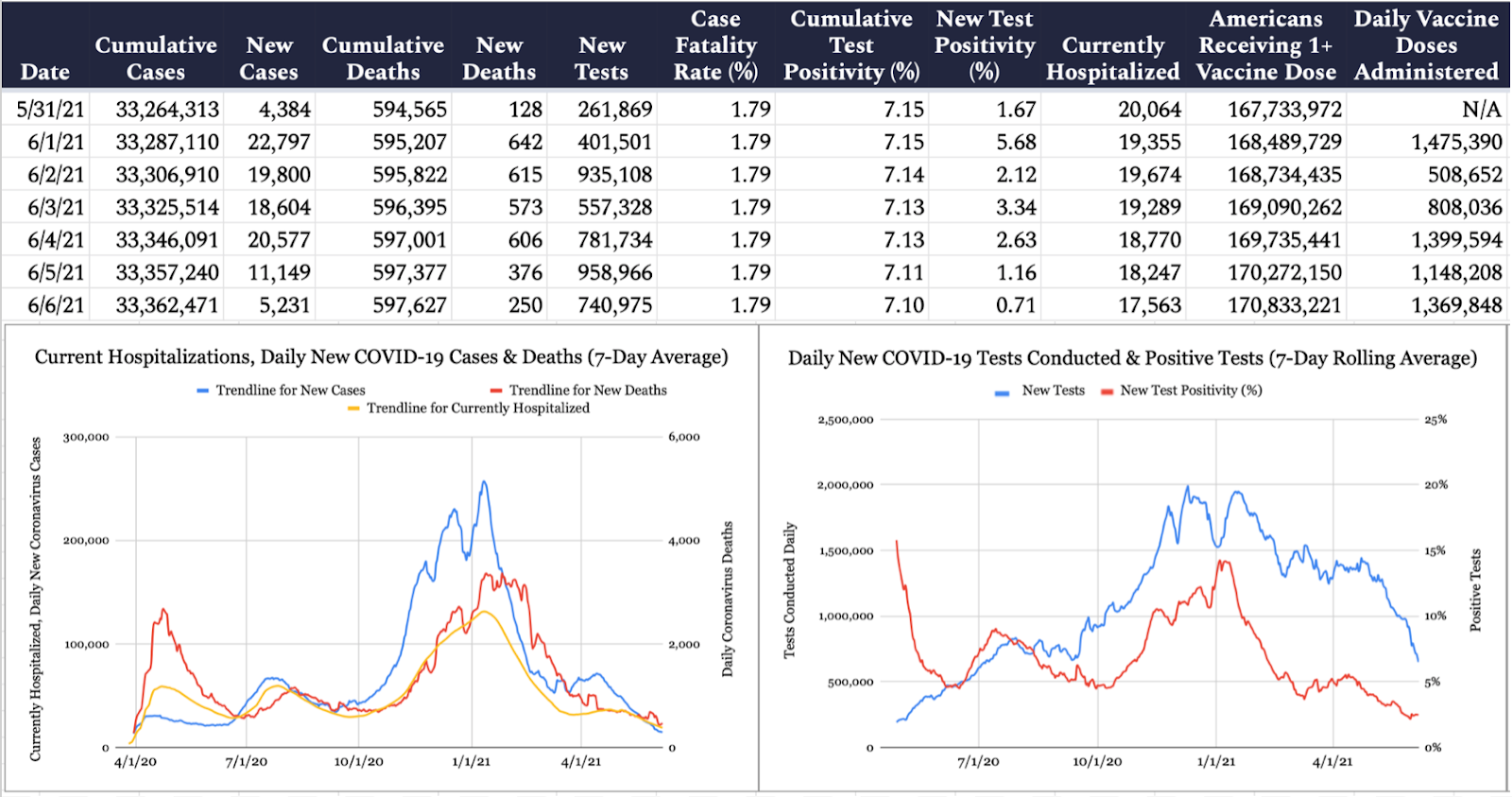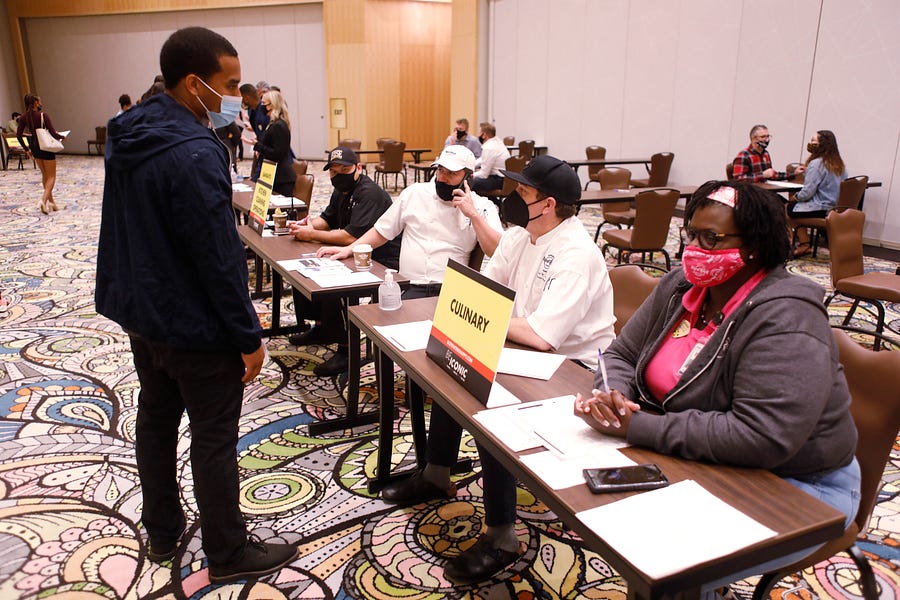Happy Monday! Seventy-seven years ago yesterday, tens of thousands of courageous soldiers and sailors stormed the beaches of Normandy and helped turn the tide of World War II along the western front.
“We were trying to make the world free for all of us,” D-Day veteran Don Pullan told Deseret News over the weekend.
Quick Hits: Today’s Top Stories
-
The U.S. economy added a net 559,000 jobs in May, according to the Bureau of Labor Statistics, with the unemployment rate ticking down to 5.8 percent from 6.1 percent in April.
-
Jihadists killed at least 130 civilians in Burkina Faso’s Yagha village over the weekend, according to the African country’s government. No group has claimed responsibility for the attack, but the Burkina Faso government is attributing it to the Islamic State in the Greater Sahara.
-
U.S. District Judge Roger Benitez ruled on Friday that California’s longstanding ban on “assault weapons” is unconstitutional. California Attorney General Rob Bonta said the state will appeal Benitez’s decision.
-
Sens. Tammy Duckworth, Dan Sullivan, and Chris Coons visited Taipei over the weekend and pledged to send 750,000 U.S. COVID-19 vaccine doses to Taiwan as Taiwan accused the Chinese government of hindering its ability to import international vaccine supply.
-
The finance ministers of the Group of Seven—which includes the United States, the United Kingdom, Canada, France, Germany, Italy, and Japan—reached an informal agreement over the weekend that would set a global minimum corporate tax rate of 15 percent. Treasury Secretary Janet Yellen praised the deal, which has been a Biden administration priority, but passing it through Congress is likely to be much more difficult.
-
Facebook announced Friday former President Donald Trump will be suspended from its platforms for two years, dating back to his initial removal on January 7, 2021.
-
The United States confirmed 5,231 new cases of COVID-19 yesterday per the Johns Hopkins University COVID-19 Dashboard, with 0.7 percent of the 740,975 tests reported coming back positive. An additional 250 deaths were attributed to the virus on Sunday, bringing the pandemic’s American death toll to 597,627. According to the Centers for Disease Control, 17,563 Americans are currently hospitalized with COVID-19. Meanwhile, 1,369,848 COVID-19 vaccine doses were administered yesterday, with 170,833,221 Americans having now received at least one dose.

A Good-Not-Great Jobs Day
After a lackluster April jobs report—the U.S. economy added just 278,000 jobs in the fourth month of 2021 when close to a million were expected—all eyes were on May’s numbers to see if the country’s post-pandemic economic recovery was accelerating. But when the Bureau of Labor Statistics sent its monthly Employment Situation Summary at 8:30 a.m. ET on Friday, investors and economists responded with a collective “meh.”
Non-farm payroll employment grew by 559,000 in May—better than 278,000 but less than the 671,000 expected—and the unemployment rate ticked down 0.3 percentage points to 5.8 percent. The latter development, however, can at least partially be attributed to the labor force participation rate dropping ever so slightly after two consecutive months of tepid growth. The struggle to return to the pre-pandemic status quo continued, with 7.6 million fewer Americans working in May 2021 than February 2020.
“Once again, Lucy pulled the football away on the payroll number,” John Fagan, co-founder of Markets Policy Partners and former director of the Treasury Department’s Markets Room, told The Dispatch. “Not as violently, maybe, as the April miss—but clearly … traders were leaning to a larger number.”
Fagan pointed to “wonkiness in the seasonal adjustments” as a reason to not yet worry too much about the consecutive misses, and noted the lower number will undoubtedly affect how the Federal Reserve approaches quantitative easing in the coming months.
“This reading, another downside surprise in non-farm payrolls, has basically absolved the Fed of having to make that decision,” Fagan said. “A lot of the sting has come out of the taper talk—at least for now.”
On May 1, the United States confirmed 44,614 cases of COVID-19, and 243.5 million vaccine doses had been administered nationwide. Four weeks later, just 12,017 people tested positive for the virus, and American arms had been jabbed with Pfizer, Moderna, or Johnson & Johnson 293.7 million times.
With the pandemic easing, the industries that grew the fastest in May are probably the ones you’d expect: +292,000 jobs for leisure and hospitality (including +186,000 in restaurants and bars alone), +58,000 for amusements, gambling, and recreation, and a combined +144,000 for local, state, and private education.
Employment wasn’t the only thing on the rise in May. Average hourly earnings grew 0.5 percent from April to May; on an annual basis, that’s a 6 percent clip. Coupled with record-high job openings, the economic data is painting a clearer and clearer picture of an economic recovery stalled by reduced labor supply.
“Employers are boosting wage offers in order to attract and retain workers, who are increasingly difficult to attract and retain,” American Enterprise Institute economist Michael Strain wrote on Friday. “This is a situation you’d expect with employers’ demand for workers growing much faster than workers are returning to the labor market. Labor demand is booming, and labor supply is not keeping up.”
President Joe Biden, in remarks Friday, credited his nearly $2 trillion American Rescue Plan for the results the country has seen thus far, and pushed for passage of his similarly-priced American Jobs Plan and American Families Plan. He also stripped the jobs numbers of enough context to claim his administration has created three times as many jobs within the first four months of his presidency as Trump did.
At the same time, Biden acknowledged policymakers can’t “reboot the world’s largest economy like flipping on a light switch,” noting there are “going to be ups and downs in jobs and economic reports.” It “makes sense,” he added, that the federal government’s boosted unemployment payments are set to expire in about 90 days.
Republicans zeroed in on this last part, touting the decision many GOP governors across the country have made to end the federal government’s weekly $300-per-week unemployment boost. “Biden and Democrats are holding back Americans from reentering the workforce and, therefore, holding back our economy,” Republican National Committee Chairwoman Ronna McDaniel said. “Thankfully, states with Republican leadership are leading the recovery and are open for business.”
Although the post-pandemic recovery has not been the economic rocket ship many investors were expecting, Fagan cautioned against ruling out a 1 million+ jobs day figure or two at some point in the next few months. “As some of these headwinds to the labor market abate,” he said, pointing to the augmented unemployment benefits, return of in-person schooling (and childcare), and general passage of time, “I certainly wouldn’t rule out a big number—even a string of big numbers.”
Facebook’s Trump Hot Potato
A few weeks ago, we reported on the back and forth between Facebook and its “independent” and “binding” Oversight Board regarding former President Trump’s accounts on the social media company’s various platforms. Trump was suspended from Facebook and Instagram on January 7—one day after the attack on the Capitol—and the company has struggled in the months since to articulate a set of clear and consistent principles that underlie the ad hoc decision, which was made under extraordinary circumstances.
Facebook (with whom The Dispatch is a fact-checking partner) punted the unenviable task to its Oversight Board in late January, but—like we were at a snowy Big 10 football game in November—the Oversight Board punted it right back. “Given the seriousness of the violations and the ongoing risk of violence, Facebook was justified in suspending Mr. Trump’s accounts on January 6 and extending that suspension on January 7,” the board’s 20 members wrote. “However, it was not appropriate for Facebook to impose an ‘indefinite’ suspension. It is not permissible for Facebook to keep a user off the platform for an undefined period, with no criteria for when or whether the account will be restored.”
It was up to Facebook, then, to attach some numbers to Trump’s ban—and let him know what he’d need to do to regain his social media privileges. They did that last week.
“Given the gravity of the circumstances that led to Mr. Trump’s suspension, we believe his actions constituted a severe violation of our rules which merit the highest penalty available under the new enforcement protocols,” Facebook VP of Global Affairs Nick Clegg wrote on Friday, announcing a two-year suspension of the former president retroactive to January 7. “At the end of this period, we will look to experts to assess whether the risk to public safety has receded. … If we determine that there is still a serious risk to public safety, we will extend the restriction for a set period of time and continue to re-evaluate until that risk has receded.” (The company did not clarify which “experts” they would look to for such a determination.)
When (or if) the ban is lifted in early 2023, Clegg added, “there will be a strict set of rapidly escalating sanctions that will be triggered if Mr. Trump commits further violations in future, up to and including permanent removal of his pages and accounts.”
In two separate statements issued about 90 minutes apart, Trump panned the ruling as an “insult” to his voters, and argued Facebook “shouldn’t be allowed to get away with this censoring and silencing.”
“Next time I’m in the White House, there will be no more dinners, at his request, with [Facebook CEO] Mark Zuckerberg and his wife,” Trump added. “It will be all business!”
Throughout this entire saga, Facebook has looked for ways to avoid having to make tough decisions about the political speech it hosts on its platform. The company was for years more deferential to world leaders than many of its Silicon Valley compatriots, citing its “newsworthiness allowance” in permitting speech that “might otherwise violate [its] standards.”
But on Friday—in conjunction with the announcement about Trump—Clegg also announced Facebook would begin treating politicians like it does everyone else, eliminating public figures’ de facto ability to violate Facebook’s community guidelines with impunity. “We will simply apply our newsworthiness balancing test in the same way to all content,” Clegg wrote, “measuring whether the public interest value of the content outweighs the potential risk of harm by leaving it up.”
Stay tuned for part three of this story in January 2023, when Trump will likely be gearing up for a third presidential bid and Facebook will—once again—have to make a monumental decision about political speech.
Worth Your Time
-
George Will on American political life is always worth your time. “The unceasing torrent of political proclamations from people whose politics are not germane to their vocations raises a question,” he writes in his latest Washington Post column. “Why do people who have nothing intelligent to say insist on proving this? The urgent question, however, is whether the ideologies of the speakers, and the sensitivities of their anticipated auditors, have produced a new etiquette: Politeness is understood as genuflection at approved political altars. Today, verifiable truth is just one option among many, with a standing inferior to any ideological agenda that the truth inconveniences.”
-
“The internet has knocked down a lot of walls and opened a lot of doors,” Kevin Williamson writes in an essay for National Review. But that, he argues, has not been an entirely good thing. “The Internet helps motivated people to exploit the power that can be had from recruiting a tiny slice of a large population. Fewer than 1 percent of U.S. households subscribe to the Washington Post, but that still puts the newspaper’s readership at more than 1 million. If your business can make a sale to 1 percent of U.S. consumers, or 1 percent of Chinese or Indian consumers, then you have a big business. And if you can get 1 percent of Twitter users to endorse your cause—even in the most low-cost fashion, with a like or a retweet—then you have an army of millions, or at least the illusion of one, which is enough to buffalo the New York Times or Disney or the University of Chicago. Getting a relatively small share of independent stock investors to rally behind your meme stock or joke currency can mobilize billions of dollars, if only temporarily. That’s real power.”
-
In a piece for Politico, Derek Robertson attempts to come up with a workable definition for “cancel culture.” Ticking through a list of so-called “cancellations” in recent years—J.K. Rowling, Roseanne Barr, Medina Spirit (the horse), Louis CK, Chrissy Teigen, the Muppets—he writes that the “concept is so amorphous that it’s tempting to dismiss it altogether.” But he does believe there’s something more at play here, arguing that the phenomenon “is neither a liberal conspiracy to enforce progressive norms, nor a right-wing straw man built to power the conservative outrage machine, but an ideologically neutral mechanism.”
Presented Without Comment
Also Presented Without Comment
Toeing the Company Line
-
Among the American elite—particularly Hollywood and the NBA—criticizing the United States is en vogue. Jonah’s Friday G-File takes those circles to task for failing to hold China to anything like the same standards. “Close your eyes and think of a standard your typical preening Hollywood prima donna invokes at the Oscars or on campus to condemn America,” he writes. “Here are a few that come to mind: free speech, democracy, police abuse, racism, reproductive freedom, corporate greed, colonialism, and corruption. … China is worse on all of them—by a lot.”
-
David’s Sunday French Press analyzed two letters from Russell Moore, who until recently served as the president of the Southern Baptist Convention’s Ethics and Religious Liberty Commission. He is now the second Moore (including Beth Moore, no relation) to publicly leave the SBC, and his letters are convicting. Calling us back to the #MeToo movement—and the charges of moral rot brought upon the progressive elites of Hollywood and academia—David asks his readers to reflect upon times in which the Christian church fails to live up to its calling.
-
Steve and Sarah were joined by Washington Post columnist Josh Rogin on the Friday Dispatch Podcast to discuss the origins of COVID-19 and why it took so long for the lab-leak theory to be taken seriously. Rogin, who first reported on a possible leak in April 2020, was unsparing in his criticism of government officials and journalists who didn’t seem particularly interested in getting to the truth. The trio also explores Rogin’s new book, Chaos Under Heaven: Trump, Xi, and the Battle for the Twenty-First Century.
-
In her first piece for the site, Emma Rogers analyzed Texas’s election reform bill, which almost passed the state’s House and is now awaiting a special session. While some Democrats accuse SB7 of being a return to Jim Crow-era voting restrictions, the reality is more complex.
-
As the Innovation and Competition Act nears passage, the Senate has voted on a surprising number of amendments offered by members on both sides of the aisle. Haley analyzes the process in Friday’s Uphill. Plus, Harvest Prude examines the challenges facing H.R. 1, Democrats’ massive voting reform bill.
Let Us Know
Do you know anyone in your own life who stormed the beaches in Normandy? Do/did they feel comfortable talking about the experience?
Reporting by Declan Garvey (@declanpgarvey), Andrew Egger (@EggerDC), Haley Byrd Wilt (@byrdinator), Audrey Fahlberg (@FahlOutBerg), Charlotte Lawson (@charlotteUVA), Ryan Brown (@RyanP_Brown), Harvest Prude (@HarvestPrude), Tripp Grebe (@tripper_grebe), Emma Rogers (@emw_96), Price St. Clair (@PriceStClair1), Jonathan Chew, and Steve Hayes (@stephenfhayes).







Please note that we at The Dispatch hold ourselves, our work, and our commenters to a higher standard than other places on the internet. We welcome comments that foster genuine debate or discussion—including comments critical of us or our work—but responses that include ad hominem attacks on fellow Dispatch members or are intended to stoke fear and anger may be moderated.
With your membership, you only have the ability to comment on The Morning Dispatch articles. Consider upgrading to join the conversation everywhere.